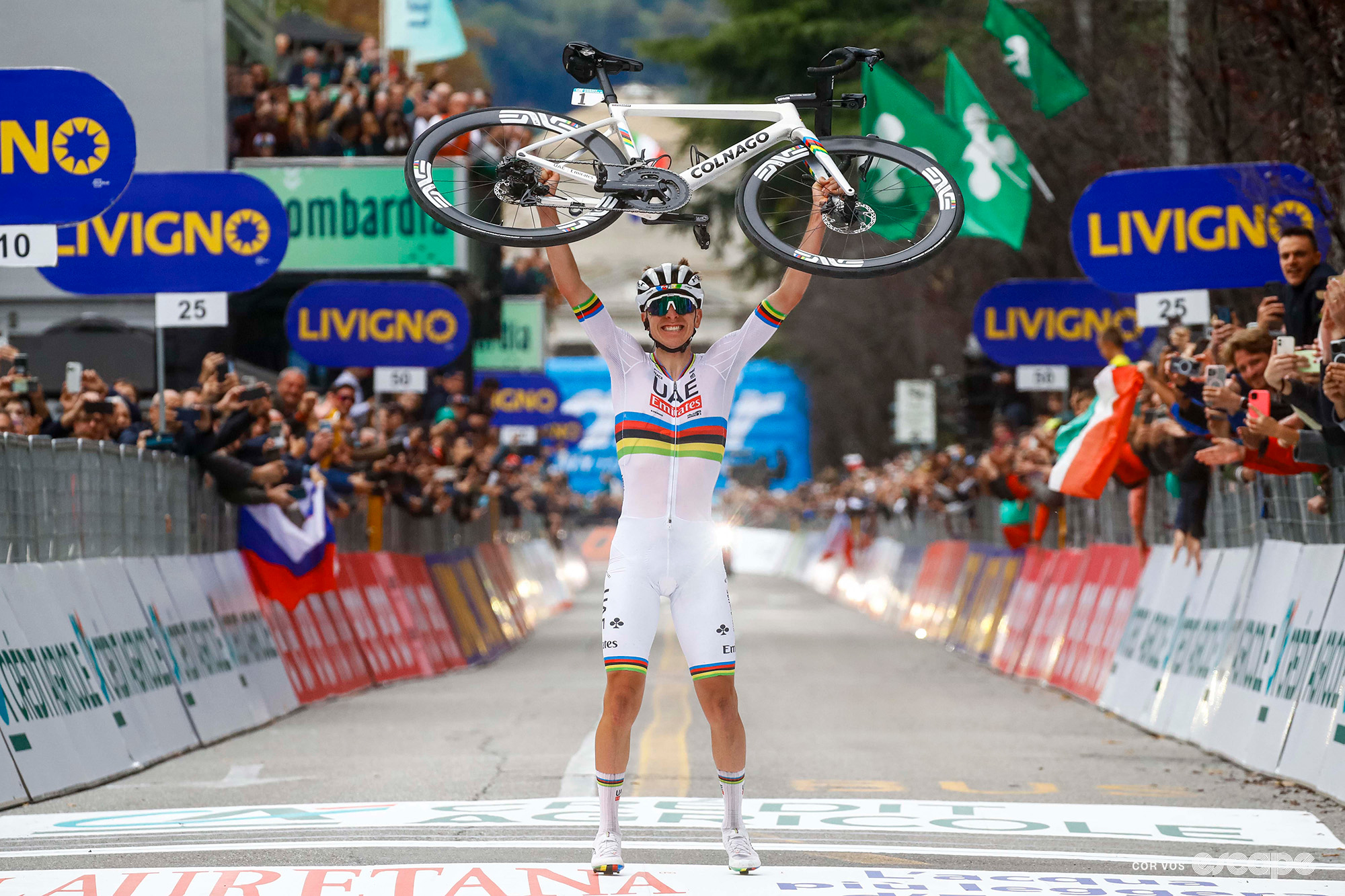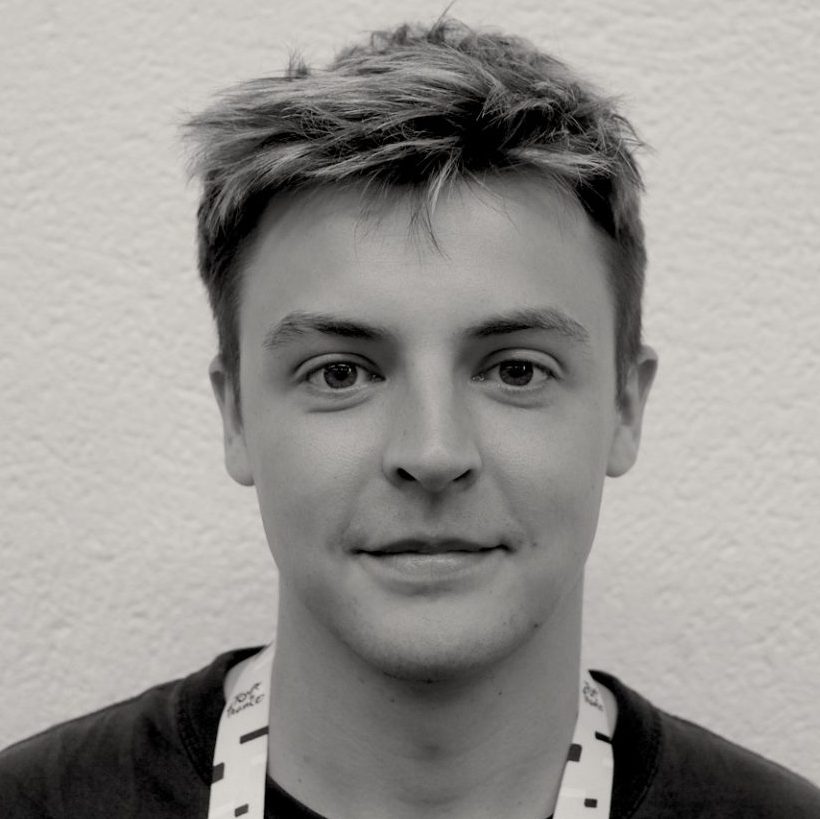Tadej Pogačar has the new highest-ever salary in cycling. He also had the previous highest-ever, but his new deal – reportedly increasing his yearly pay of €7 million a year to €8 million a year – is symbolic of a dominant 2024 season that deserved extra reward.
Italian newspaper La Gazzetta dello Sport reported the specifics of a contract extension signed two weeks ago, one which will keep him at UAE Team Emirates until 2030, when he is 32 years old, an age it’s hard to imagine a man who resembles an ensemble member of Peter Pan’s Lost Boys ever being.
But what does that contract length even mean in this day and age, you ask, where contracts now are seemingly bought out and torn up at the whim of rider or team? Well, UAE have thought of that and they’ve set his buyout clause at (imagine an Austin Powers Dr. Evil voice) €200 million!
It’s huge. Astronomical. And a real quirk of the professional cycling business that these figures are represented in legal failsafes rather than the purchase price of star athletes.
“Simply, Tadej is not on the market, he doesn’t want to leave, he’s part of this country,” team principal Mauro Gianetti told the Italian newspaper at the recent eSports World Championships, held in Abu Dhabi and attended by Pogačar, of course (the race took place on the virtual cycling platform MyWhoosh, a UAE team sponsor owned by a sovereign wealth vehicle called The Royal Group).
“What he’s doing for Abu Dhabi is worth much more than the races he wins, and Pogacar is proud of it,” Gianetti continued. “It creates enthusiasm: there are children who cry when they receive a selfie of him, there’s a nation that has discovered the bike and rides it, there’s a very strong bond with the royal family. Cycling has become the national sport.”
The line “he’s part of this country” bears discussion. Yes, Pogačar is still a breath of fresh air despite his dominance, His personality a tonic to the slightly sullen and serious stars of yesteryear. But his millions (which are also sheltered in the tax haven of Monaco, but let’s stay on track) are paid to him by a nation state that restricts freedom of speech and freedom of the press and has laws that discriminates against women and migrants and criminalises LGBT individuals. You can read all about it here in a Human Rights Watch report; it’s something the cycling world, us included, decides most of the time to conveniently forget about. Yep, lots of countries aren’t perfect, but not everyone is paid handsomely to proudly wear a nation’s name across their chest on a worldwide stage.
In fairness to Pogačar, for most of the year he is well-removed from domestic UAE matters, instead surrounded by an outwardly friendly team that is totally devoted towards him and his goals, and crucially was the first to come sniffing around his talent and set him on the path to achieve what he has. “This team is my family,” the Slovenian said. “UAE was the first team that came looking for me when I was a kid.” Whatever he thinks privately about various matters, I’m sure we’ll never know.

Have fun in the comments section with that one, but back to the figures from the weird vacuum of sports-based pay discussion.
Tadej Pogačar is undoubtedly worth the money. His 25 victories this past season equate to €280,000 per win. And that’s without bonuses, of which he must have squeezed out every last drop available.
This is a bargain compared to the cost per victory of a Premier League football game, which depending on squad budget runs from the low tens of millions upwards, which from various estimates seems to be the same for an NFL win too.
But maybe a more accurate comparison would be to assess against other athletes who earn roughly €8 million a year: Fulham FC goalkeeper Bernd Leno. Chicago Bears guard Nate Davis. Or Cleveland Cavaliers’ backup power forward Georges Niang. This isn’t meant to besmirch these particular athletes but to illustrate that there are levels to the game of sports earnings.
These other athletes obviously benefit from a sporting economy that is much more flush with money due to higher popularity than cycling, paying fans filling stadiums and a share of bumper TV rights deals, the latter of which does not seem feasible for cycling currently.
So maybe a better question is: what is Tadej Pogačar actually worth? With the likes of Remco Evenepoel, Jonas Vingegaard, Mathieu van der Poel, and even Tom Pidcock all earning roughly half of what he does now, would you trade one Pogačar for two of them? How much of Pogačar’s value comes from him winning bike races and how much is down to his marketable personality, a friendly and winning face that is the goal of the UAE pouring their sponsorship money into this project. Would €10 million be too much? €15 million? If you had a median WorldTour budget of €24 million, how much would be too much to give Pogačar? Currently, his salary accounts for 1/46,000th of the UAE’s GDP.
When we look back, I reckon the shifting waters of how riders are valued and how these stars’ contracts are structured will be one of the defining stories of this mini-era. And as wins seem to become increasingly concentrated, the value of those able to deliver them will only continue to increase.
Did we do a good job with this story?


